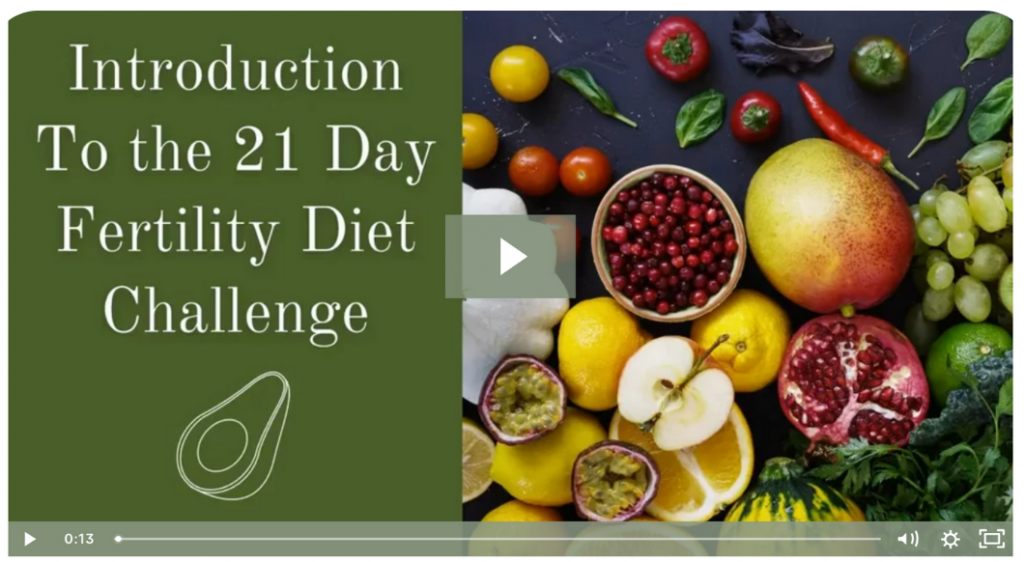Wondering about a Fertility Diet for men? What a man eats during the preconception stage is just as important as what the woman is eating, especially if you are experiencing fertility issues. There are specific nutrients men need and here are some of the important reasons for men to eat a healthy Fertility Diet are:
Protecting and encourage healthy DNA – DNA is be passed on and will be responsible for creating half of your child, the other half being provided by the woman. Certain chemicals and nutritional deficiencies can damage DNA – moking, pesticides, alcohol and chemicals. Eating healthy foods that contain DNA-protecting antioxidants and nutrients can help to reverse the damage. It is estimated that 80% of the sperm produced by a healthy male is DNA-damaged.
Queen’s University, Belfast, Professor Sheena Lewis (internationally-acclaimed academic in male fertility) and colleagues have revealed through their research of 203 couples undergoing IVF and 136 couples undergoing ICSI that in 80% of couples with unexplained infertility there is high sperm DNA damage. (Reproductive Biomedicine Online).
Promote sperm health – eating a nutrient-dense diet can help to not only prevent damage to your sperm, but can also help to promote sperm health. Nutrients such as zinc, selenium and vitamin C (plus many others) have been shown to help increase sperm health, motility and mobility. Just over the last 50 years, male sperm counts have declined rapidly – originally a common/healthy number was 500 million. Now most doctors still hope to see 20 million sperm/mL in a semen sample, but in 2010 the World Health Organization (WHO) revised lower reference limits for human semen characteristics, determining that sperm concentrations in healthy men at 15 million spermatozoa/mL are adequate. (Journal of human reproductive sciences)
Health during conception = healthy pregnancy = healthy baby – Your future child will be created from you and your partner’s DNA. Preparing for conception helps to set you up for a healthy pregnancy and baby. Switching your eating habits at least 3 months before conception can help you create healthy sperm (sperm is produced in a 3-month cycle; what you eat today creates the sperm you will be using 3 months from now) as well as supports the eating habits of your pregnant partner.
Encourage and support healthy libido – a poor diet rich in fats and low in nutrients and hydration can cause low libido and hormonal issues for men. This can make it hard for couples to conceive and also cause sperm to be of less than optimal health.
Important Nutrients for Male Fertility Health
We have gone over many of the reasons to eat a healthy male fertility diet; now we will cover how to eat in a way that promotes male fertility.
As with women, we generally recommend beginning with a Fertility Cleanse to help support the body in eliminating toxins from past years of an unhealthy diet and lifestyle choices. Click here to learn about Male Specific Fertility cleansing.
The male fertility diet does not differ much from a woman’s fertility diet, but some specific nutrients need to be focused on in addition to eating a whole food Fertility Diet (read on and then come back to click to learn more). Here are some of the most important nutrients needed for sperm health and the foods that are rich in those nutrients. Foods are listed from highest content of the specific nutrient on to the next highest and so on. All foods listed are the foods that are extremely rich in the mentioned nutrient.
Zinc
Having a zinc deficiency can actually reduce testosterone levels. Supplementation with zinc has been found to increase testosterone, sperm count and motility. One double-blind, randomized, placebo-controlled trial published in Fertility and Sterility finds men who take folic acid and zinc together experience a stunning 74% increase in total sperm count! Zinc deficiencies are some of the most common deficiencies found in both men and women. The reason for this is that zinc can be damaged when foods are cooked or processed. So it is important to eat a diet that is at least 50% raw foods (this is easy to do; take a look at the daily diet suggestions later in this article).
Foods rich in zinc are: meats like beef tenderloin, lamb, oysters, shrimp, and venison (deer), but since we do not want to eat meat raw, some sources of easy to get/eat sources of zinc are sesame seeds, raw pumpkin seeds, and green peas.
Folic acid
New research suggests that folic acid (in the B vitamin family) can boost sperm health. Men with low levels of folate had increased risks for sperm that contained too little or too many chromosomes. If an egg is fertilized with one of these abnormal sperm, it could result in a birth defect such as Down syndrome, or an increase in miscarriage.
Folic acid is found in: lentils, beans (1 cup provides almost your entire daily needs), pinto beans, garbanzo beans, asparagus, spinach, black beans, navy beans, kidney beans, and collard greens. One serving a day of any of these foods provides anywhere from 50-90% of your daily needs.
B12
Vitamin B12 has been shown to increase sperm counts. In a 2017 metanalysis out of Jordan University of Science and Technology, articles and abstracts from September 1961 to March 2017 showed that “Since 2000, a number of studies proposed vitamin B12 as a candidate therapy to recover or enhance semen quality. Sinclair [29] proposed vitamin B12 as a nutritional therapy that improved semen quality, mainly sperm count and motility. In 2006, vitamin B12 was suggested as one of the candidate drugs to manage male infertility due to its positive effects on sperm parameters, particularly sperm count [30]. In 2013, an oral antioxidant treatment including vitamin B12 was found to improve sperm vitality, motility, and DNA integrity [31].”
Many people are deficient in B12– meat-eaters and vegetarians alike. Healthy levels of B12 depend on healthy digestion, which most people lack due to eating a highly processed diet.
Some foods rich in B12 are: dairy and animal products, but we know that B12 is an important nutrient that needs to be supplemented to make sure you are getting enough, regardless of the state of your digestive system.
Vitamin C
Vitamin C protects sperm from oxidative damage. It will help to increase the quality of sperm in smokers and reduces sperm agglutination (when they clump together). Vitamin C is another nutrient that is sensitive to cooking and processing so it important to get it from eating foods raw. Drinking store-bought orange juice will not help to increase your vitamin C levels as it has been pasteurized at high-heat levels and has lost all of its DNA protecting abilities; orange juice should be consumed fresh-squeezed only.
Some foods that are rich in vitamin C (and should be eaten raw) are: papaya, bell peppers, broccoli, Brussels sprouts, strawberries, oranges, kiwifruit, cauliflower, and kale.
L-Carnitine
This amino acid is a necessary nutrient for sperm cells to function normally. Research published in Fertility and Sterility and the International Journal of Andrology shows that supplementing with L-Carnitine helps to normalize sperm motility in men with low sperm quality and can help increase sperm count. Carnitine and CoQ10 have been shown to work synergistically when combined.
Foods rich in L-Carnitine are: nuts, seeds, and many vegetables, including artichokes, asparagus, beet greens, broccoli, Brussels sprouts, collard greens, garlic, mustard greens, okra, and parsley.
CoQ10
Acts as an antioxidant protecting the sperm cells from damage. Ubiquinone has been found in seminal fluid where it is believed to play an important metabolic and antioxidant function protecting sperm health (Journal of Endocrinological Investigation). CoQ10 has also been shown to increase sperm motility. It has been shown that our CoQ10 levels decrease as we age.
Foods rich in CoQ10 are: beef, marinated herring, rainbow trout, salmon, organ meats, peanuts, pistachios, sesame seeds, raw broccoli, strawberries and oranges, and eggs, plus whole grains that still contain the germ.
Watch The Introduction to the 21 Day Fertility Diet Challenge
- Learn how to transition to a natural fertility diet by focusing on the important 5
- Get all the details on how to use nutrition as a tool for hormonal health, cell protection and fertility wellness
- An effective tool to help your tastebuds transition towards healthier foods
- Learn which foods are most important for fertility and how to regularly eat them

Male Fertility Diet Tips
Here are some fertility diet tips to incorporate into your current diet which will help you get all the nutrients needed for healthy male fertility…
- Eat only organic – Pesticides have been shown to be one of the main reasons for the declining fertility in men. They mimic estrogen in the body which can cause testosterone to decrease. Healthy testosterone levels are necessary for sperm production.
- Avoid soy foods – Soy foods are another estrogen-mimicking food that should be avoided.
- Eat one fertility smoothie a day – By including one fertility smoothie every day, you are able to get an abundant supply of antioxidants, vitamins, and minerals in an easy to eat and digest form.
- Eat at least one large green salad per day – Eating a large salad that contains many different varieties of vegetables will help to supply your body with the nutrients it needs for optimal health and DNA protection. Make sure to add some raw sesame and pumpkin seeds on top for added zinc.
- Eat one dark leafy green vegetable a day – Dark leafy vegetables such as broccoli, kale, swiss chard, collards and spinach are packed with nutrition.
- Enjoy nuts and seeds daily – You can use nuts and seeds in your smoothies, as a trail mix, on top of salads, and make nut milks.
- Drink plenty of water
- Drink fresh pressed vegetable and fruit juices – one of the easiest ways to get your daily supply of whole-food nutrients into your body is through fresh juices.
- Avoid dairy products or at least keep it to a minimum – Conventional dairy contains hormones (mostly estrogen) which, as stated above can have a negative impact on testosterone levels. You can replace milk with nutrient and protein-rich nut milks.
By incorporating these tips into your daily diet, you will begin to have more energy and will create a stronger immune system, as well as promote healthy fertility. For some ideas on what to eat, recipes, and smoothie ideas, check out the 21-Day Fertility Diet Challenge.
- “The Disappearing Male” – A Pinch of Science, a Pound of Speculation. (n.d.). Retrieved from https://sciencebasedmedicine.org/the-disappearing-male-a-pinch-of-science-a-pound-of-speculation/
- Kumar, N., & Singh, A. K. (2015). Trends of male factor infertility, an important cause of infertility: A review of literature. Journal of human reproductive sciences, 8(4), 191-6. Retrieved from https://www.ncbi.nlm.nih.gov/pmc/articles/PMC4691969/
- L. Simon, I. Proutski, M. Stevenson, D. Jennings, J. McManus, D. Lutton, S.E.M. Lewis. Sperm DNA damage has a negative association with live-birth rates after IVF. Reproductive BioMedicine Online, 2012; DOI: 10.1016/j.rbmo.2012.09.019. Retrieved from https://www.rbmojournal.com/article/S1472-6483(12)00590-1/fulltext
- Banihani S. A. (2017). Vitamin B12 and Semen Quality. Biomolecules, 7(2), 42. doi:10.3390/biom7020042. Retrieved from https://www.ncbi.nlm.nih.gov/pmc/articles/PMC5485731/
- Wong WY, Merkus HM, Thomas CM, Menkveld R, Zielhuis GA, Steegers-Theunissen RP. (2002, March). Effects of folic acid and zinc sulfate on male factor subfertility: a double-blind, randomized, placebo-controlled trial. Fertility and Sterility; 77(3):491-8. Retrieved from: https://www.ncbi.nlm.nih.gov/pubmed/11872201
- Lenzi, A., Lombardo, F., Sgrò, P., Salacone, P., Caponecchia, L., Dondero, F., & Gandini, L. (2003). Use of carnitine therapy in selected cases of male factor infertility: A double-blind crossover trial. Fertility and Sterility, 79(2), 292-300. doi:10.1016/s0015-0282(02)04679-4 Retrieved from: https://www.fertstert.org/article/S0015-0282(02)04679-4/fulltext
- Johansen, L., & Bohmer, T. (1979). Motility Related to the Presence of Carnitine/Acetyl-Carnitine in Human Spermatozoa. International Journal of Andrology, 2(1-6), 202-210. doi:10.1111/j.1365-2605.1979.tb00053.x Retrieved from: https://onlinelibrary.wiley.com/doi/abs/10.1111/j.1365-2605.1979.tb00053.x
- Balercia, G., Mancini, A., Paggi, P., Tiano, L., Pontecorvi, A., et al. (21 May 2009). Coenzyme Q10 and male infertility. J Endocrinol Invest (2009) 32: 626. https://doi.org/10.1007/BF03346521. Retrieved from https://link.springer.com/article/10.1007/BF03346521





